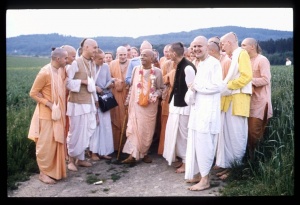CC Madhya 22.162: Difference between revisions
No edit summary |
(Vanibot #0054 edit - transform synonyms into clickable links, which search similar occurrences) |
||
| Line 19: | Line 19: | ||
<div class="synonyms"> | <div class="synonyms"> | ||
''na'' | ''[//vanipedia.org/wiki/Special:VaniSearch?s=na&tab=syno_o&ds=1 na]'' — not; ''[//vanipedia.org/wiki/Special:VaniSearch?s=karhicit&tab=syno_o&ds=1 karhicit]'' — at any time; ''[//vanipedia.org/wiki/Special:VaniSearch?s=mat&tab=syno_o&ds=1 mat]-[//vanipedia.org/wiki/Special:VaniSearch?s=parāḥ&tab=syno_o&ds=1 parāḥ]'' — devotees of Me; ''[//vanipedia.org/wiki/Special:VaniSearch?s=śānta&tab=syno_o&ds=1 śānta]-[//vanipedia.org/wiki/Special:VaniSearch?s=rūpe&tab=syno_o&ds=1 rūpe]'' — O mother, the symbol of peacefulness; ''[//vanipedia.org/wiki/Special:VaniSearch?s=naṅkṣyanti&tab=syno_o&ds=1 naṅkṣyanti]'' — will perish; ''[//vanipedia.org/wiki/Special:VaniSearch?s=na&tab=syno_o&ds=1 na] u'' — nor; ''[//vanipedia.org/wiki/Special:VaniSearch?s=me&tab=syno_o&ds=1 me]'' — My; ''[//vanipedia.org/wiki/Special:VaniSearch?s=animiṣaḥ&tab=syno_o&ds=1 animiṣaḥ]'' — time; ''[//vanipedia.org/wiki/Special:VaniSearch?s=leḍhi&tab=syno_o&ds=1 leḍhi]'' — licks up (destroys); ''[//vanipedia.org/wiki/Special:VaniSearch?s=hetiḥ&tab=syno_o&ds=1 hetiḥ]'' — weapon; ''[//vanipedia.org/wiki/Special:VaniSearch?s=yeṣām&tab=syno_o&ds=1 yeṣām]'' — of whom; ''[//vanipedia.org/wiki/Special:VaniSearch?s=aham&tab=syno_o&ds=1 aham]'' — I; ''[//vanipedia.org/wiki/Special:VaniSearch?s=priyaḥ&tab=syno_o&ds=1 priyaḥ]'' — dear; ''[//vanipedia.org/wiki/Special:VaniSearch?s=ātmā&tab=syno_o&ds=1 ātmā]'' — the Supersoul; ''[//vanipedia.org/wiki/Special:VaniSearch?s=sutaḥ&tab=syno_o&ds=1 sutaḥ]'' — the son; ''[//vanipedia.org/wiki/Special:VaniSearch?s=ca&tab=syno_o&ds=1 ca]'' — and; ''[//vanipedia.org/wiki/Special:VaniSearch?s=sakhā&tab=syno_o&ds=1 sakhā]'' — friend; ''[//vanipedia.org/wiki/Special:VaniSearch?s=guruḥ&tab=syno_o&ds=1 guruḥ]'' — spiritual master; ''[//vanipedia.org/wiki/Special:VaniSearch?s=suhṛdaḥ&tab=syno_o&ds=1 suhṛdaḥ]'' — well-wisher; ''[//vanipedia.org/wiki/Special:VaniSearch?s=daivam&tab=syno_o&ds=1 daivam]'' — the Deity; ''[//vanipedia.org/wiki/Special:VaniSearch?s=iṣṭam&tab=syno_o&ds=1 iṣṭam]'' — chosen. | ||
</div> | </div> | ||
Latest revision as of 22:54, 19 February 2024

A.C. Bhaktivedanta Swami Prabhupada
TEXT 162
- na karhicin mat-parāḥ śānta-rūpe
- naṅkṣyanti no me 'nimiṣo leḍhi hetiḥ
- yeṣām ahaṁ priya ātmā sutaś ca
- sakhā guruḥ suhṛdo daivam iṣṭam
SYNONYMS
na — not; karhicit — at any time; mat-parāḥ — devotees of Me; śānta-rūpe — O mother, the symbol of peacefulness; naṅkṣyanti — will perish; na u — nor; me — My; animiṣaḥ — time; leḍhi — licks up (destroys); hetiḥ — weapon; yeṣām — of whom; aham — I; priyaḥ — dear; ātmā — the Supersoul; sutaḥ — the son; ca — and; sakhā — friend; guruḥ — spiritual master; suhṛdaḥ — well-wisher; daivam — the Deity; iṣṭam — chosen.
TRANSLATION
" 'My dear mother, Devahūti! O emblem of peace! My weapon, the disc of time, never vanquishes those for whom I am very dear—for whom I am the Supersoul, son, friend, spiritual master, well-wisher, worshipable Deity and desired goal. Since the devotees are always attached to Me, they are never vanquished by the agents of time.'
PURPORT
This was spoken by Kapiladeva to His mother Devahūti and is recorded in Śrīmad-Bhāgavatam (SB 3.25.38). Kapiladeva instructed His mother in sāṅkhya-yoga, but the importance of bhakti-yoga is mentioned here. Later sāṅhkya-yoga was imitated by atheists, whose system was founded by a different Kapiladeva, Ṛṣi Kapiladeva.